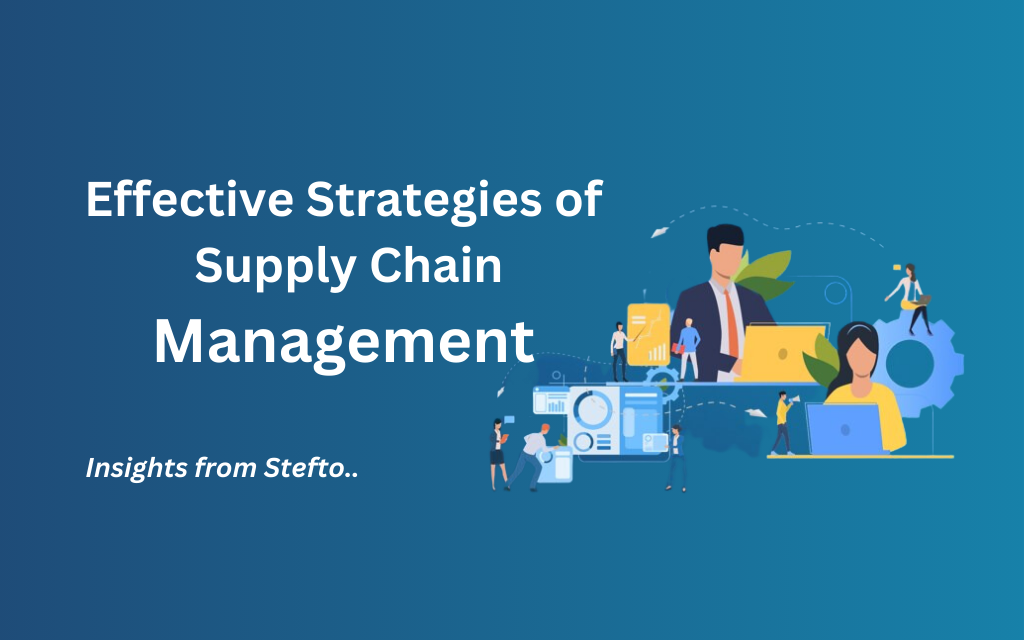In today’s global business landscape, effective supply chain management is vital for ensuring the smooth flow of goods and services, optimizing costs, and delivering value to customers. A well-structured supply chain can significantly impact an organization’s competitiveness and profitability. In this article, we will explore some effective strategies of supply chain management and take a closer look at Stefto Company as an example of successful implementation.
Understanding Supply Chain Management:
Supply chain management (SCM) involves the planning, coordination, and control of various activities that transform raw materials into finished products and deliver them to customers. It encompasses everything from sourcing and procurement to production, distribution, and customer service. Effective SCM can result in reduced costs, improved efficiency, and increased customer satisfaction.
Effective Strategies of Supply Chain Management:
- Supplier Relationship Management (SRM): Building strong relationships with suppliers is crucial. Effective SRM involves selecting the right suppliers, collaborating on product development, and fostering mutual trust. Stefto Company, for instance, has a reputation for nurturing long-term partnerships with suppliers, ensuring a steady and high-quality supply of materials.
- Demand Forecasting: Accurate demand forecasting is essential for optimizing inventory levels and production schedules. Companies like Stefto invest in advanced forecasting tools and data analytics to predict customer demand more accurately.
- Inventory Optimization: Balancing inventory levels to meet demand while minimizing carrying costs is a key SCM strategy. Just-in-time (JIT) inventory management, as practiced by Stefto, minimizes excess inventory and reduces storage costs.
- Logistics and Distribution: Efficient transportation and distribution networks are critical. Companies often invest in route optimization software and partner with logistics experts to streamline these processes. Stefto utilizes advanced logistics systems to ensure on-time delivery to customers.
- Technology Integration: Integration of technology, including blockchain, Internet of Things (IoT), and supply chain management software, enhances transparency, traceability, and real-time monitoring. Stefto leverages these technologies to track product movements and quality throughout the supply chain.
- Risk Management: Anticipating and mitigating supply chain risks, such as natural disasters or disruptions in the global market, is essential. Companies like Stefto employ risk assessment models and contingency plans to ensure business continuity.
- Sustainability and Green Practices: Sustainable practices are increasingly vital in supply chain management. Organizations are adopting environmentally friendly processes, such as reducing waste, optimizing packaging, and sourcing materials responsibly. Stefto emphasizes sustainability throughout its supply chain, promoting eco-friendly production and transportation methods.
- Continuous Improvement: A culture of continuous improvement, often facilitated by methodologies like Lean Six Sigma, ensures that supply chain processes are regularly reviewed and enhanced. Stefto maintains a commitment to ongoing improvement, with dedicated teams focused on optimizing supply chain operations.
Stefto Company as a Model of Effective Supply Chain Management:
Stefto Company has earned recognition as a leader in supply chain management excellence. By implementing the strategies mentioned above, Stefto has achieved the following:
- Enhanced customer satisfaction through timely deliveries and product quality.
- Reduced operational costs by optimizing inventory levels and transportation routes.
- Increased competitiveness in the market by responding swiftly to changing customer demands.
- Mitigated risks by diversifying suppliers and implementing robust contingency plans.
- Committed to sustainable and responsible sourcing and production practices.
Conclusion:
Effective supply chain management is a dynamic process that requires a holistic approach, incorporating strategies like supplier relationship management, demand forecasting, and continuous improvement. Companies like Stefto serve as exemplars of successful supply chain management by combining these strategies with the latest technology and a commitment to sustainability. In today’s fast-paced and competitive business environment, mastering these supply chain strategies is essential for organizations looking to thrive and meet the demands of their customers and stakeholders.

Usually I do not read article on blogs however I would like to say that this writeup very compelled me to take a look at and do it Your writing style has been amazed me Thank you very nice article
Its like you read my mind You appear to know so much about this like you wrote the book in it or something I think that you can do with a few pics to drive the message home a little bit but instead of that this is excellent blog A fantastic read Ill certainly be back